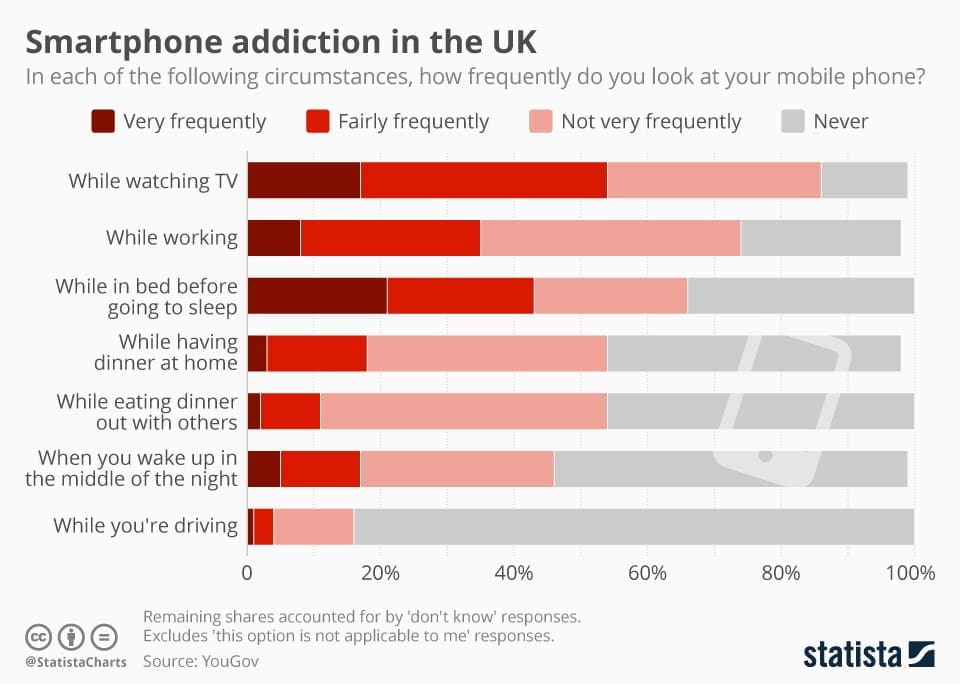
Most of us are guilty of spending too much time on our mobile phones. In our ‘always-on’ society phones have become a lifeline for work, leisure and social activities. But when does a bit of harmless scrolling become a phone addiction? Google Trends report that 95% of android users pick up their phones every six minutes and are alerted every seven. Over the past five years searches for ‘cell phone addiction’ have also risen indicating that many people are concerned about having an unhealthy relationship with their phone.
At Delamere, we don’t only treat alcohol addiction and drug addiction at our purpose-built wellness retreat in Cheshire. We also offer therapeutic treatments for a wide variety of other addictions, some of which are closely linked to mobile phone addiction. In this article, we’ll explore some of the causes and symptoms of mobile addiction and what we can do to help.
What is phone addiction?
n general, addiction means ‘the strong and harmful need to regularly have or do something’. Phone addiction is the compulsive overuse of a smartphone where a person might be fearful of not having their phone (nomophobia) or not being able to send or receive messages (textaphrenia) because it has become such an integral part of their lives. Some people may even experience phantom vibrations – the feeling that their phone is sending them alerts, even when it isn’t.
Mobile phone addiction is a behavioural action considered to be similar to internet addiction, love and sex addiction and other online compulsions, such as gaming addiction and gambling addiction. It is characterised by a person developing a habitual and dependent pattern of using their phone that negatively affects their lives and leads to loss of impulse control.
What causes smartphone addiction?
People who have psychological and emotional issues such as stress, depression, loneliness and social anxiety can easily get addicted to technology. The experiences that smartphones connect us to – social media, games, videos, apps – can all give us pleasure. Some theorists suggest that by releasing the chemical dopamine in the brain, mobile phones can have a similar effect to when we drink alcohol or take drugs.
As people have become more reliant on their phones in everyday life, the number of people experiencing mobile phone addiction has naturally increased. More business is conducted over smartphones than ever before, and the growth of social media can mean some people spend an average of 3.5 hours per day on their phones.
A recent global survey also showed that the Covid-19 pandemic has increased mobile phone addiction. The study showed that about 70% of internet users, especially young people, were using their smartphones more as a direct result of lockdown. The more we use our phones, the more likely we are to become addicted to them.

Symptoms of mobile phone addiction
Heavy smartphone use is very common. It’s only when your phone begins to take you away from social interactions, gets in the way of work or becomes a major distraction in daily life that you may have a problem. If you find that you’re reaching for your phone to help you feel happier or to fill a void this can also indicate you may be forming an unhealthy and destructive habit.
At Delamere, we take a person-centred, holistic approach to treating phone addiction using a combination of one-to-one-counselling sessions, peer work and group therapy sessions. We treat each person individually and look at their life as a whole to understand their challenges before creating a personalised care plan. As phone addiction is a relatively new phenomenon, we will first assess if you would benefit from therapy.
So, how can you tell if you’re addicted to your phone? It’s not always about how much time you spend on your mobile. Other behaviours can also point to smartphone addiction. You may find yourself being easily distracted, lying about the amount you use your phone, becoming overly stressed if your battery dies or feeling angry if something, or someone, stops you from using your phone.
Mobile phone addiction can have a negative impact on all areas of your life, from interactions with family and friends to your performance at work. The person displaying the addictive behaviours often doesn’t realise how their phone addiction is directly affecting their health and relationships with others.
Loneliness and insecurity
Some people rely very heavily on their phone to overcome feelings of loneliness and depression, when actually the pressures of social media or misreading of text messages can make these emotions worse.
Lack of sleep
Whether it’s checking your work emails right before bed or surfing the web as soon as you wake up, mobile phone addiction not only affects your ability to get to sleep but also impairs the quality of your sleep.
Inability to focus
Constant interaction with your phone disrupts your working day and diminishes the ability to study. Mobile phone addiction also delays essential tasks at home, meaning you may forget to do something or be so wrapped up in playing games or texting that important jobs are overlooked.
Becoming self-absorbed
As well as putting a physical barrier between yourself and whoever you’re with, an obsession with wanting to compulsively check social media, sharing pictures of food, holidays and yourself, can mean you become more connected with your online world than the real one.
How is mobile phone addiction treated?
The cause and effect of smartphone addiction have many parallels with alcohol addiction, drug addiction and the other addictions we treat at Delamere. There is always a reason for addictive behaviour, and we like to work closely with our guests to get to the root causes, identify any triggers and develop strategies to cope with unhealthy habits.
The first part of the process is helping you to stop the undesired behaviour. In this case, the overuse of your mobile phone. We will then apply evidence-based treatments to help change your mindset and develop techniques to prevent a relapse. We use a wide range of innovative therapeutic processes, from psychoeducational workshops to somatic healing, to bring about positive, lasting change.
People who come to stay with us at our wellness retreat beside Delamere forest benefit from high levels of personalised care from a qualified team of doctors, counsellors and therapists who are there to support you during your stay and for 12 months after you leave us.

References
1. Sebire, K. The 2020 Conversation. The coronavirus lockdown is forcing us to view ‘screen time’ differently. That’s a good thing.






